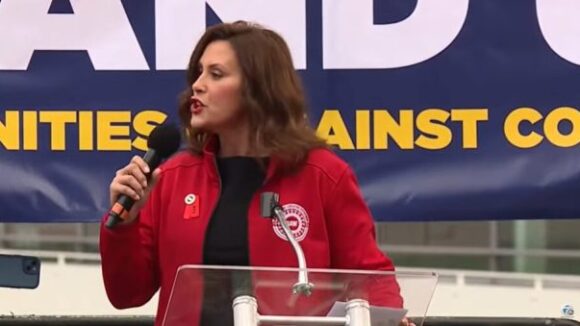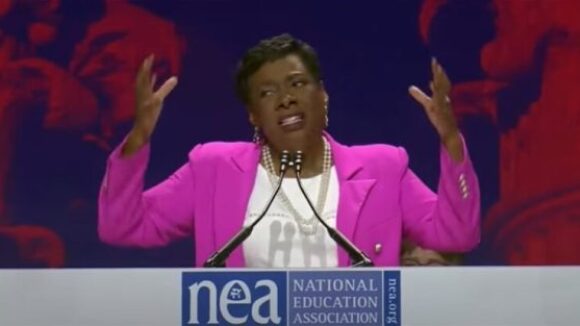Tyranny Triumphs in the Great Lakes State
Ignoring ample evidence of forced unionism’s unfairness and its damaging impact on jobs and incomes, Big Labor Michigan Gov. Gretchen Whitmer signed Right to Work destruction in 2023.
Big Labor Victories Curtail Dissenting Employees’ Free Speech
(click to download newsletter)
 In November 2012, roughly 63 million Americans nationwide voted against the winning candidate for U.S. President, Barack Obama.
In November 2012, roughly 63 million Americans nationwide voted against the winning candidate for U.S. President, Barack Obama.
People who cast their ballots for Mitt Romney, Gary Johnson, Jill Stein, and the numerous other candidates who didn’t win were undoubtedly disappointed.
But many have been able to take consolation in the fact that, as citizens, they continue to have the First Amendment freedom to speak out against the Obama Administration initiatives they oppose, and do everything they can to ensure those initiatives are never implemented.
They also retain the freedom to hire, individually or collectively, spokesmen to represent in Washington, D.C., views they hold that are contrary to the President’s.
Workers Must Allow Officers Of a Union They Didn’t Vote For to Speak on Their Behalf
Unfortunately for American employees, under federal labor statutes and dozens of state laws, workplace elections concerning unionization are in this regard little like public elections.
If the majority of voting employees cast ballots in favor of being unionized, federal law and many state laws dictate that the minority who oppose unionization may no longer share with their employer their own opinions on compensation and work-rule issues.
Employees who disagree with the stands taken by their union monopoly-bargaining agent are also prohibited from spending their own money to hire a representative to present their views, rather than the union’s, directly to the employer.
Clearly, then, the freedom of speech of the minority voting against unionization in an election a union wins is far less protected than the free speech of citizens who vote for candidate B, C or D is protected in the public square after candidate A wins.
Therefore, contrary to a key unstated assumption of many union officials and forced-unionism apologists who are now caterwauling about the impact of Wisconsin’s Act 10, it makes perfect sense that the bar for winning a unionization election should be higher than the bar for winning a public election.
National Right to Work Committee members and, polls over the years indicate, the vast majority of other Americans agree that, no matter which side wins a unionization vote, the minority should remain free to present their own views on workplace issues to the employer, even if those views don’t jibe with the union’s.
‘The Problem With Act 10 Is That It Didn’t Go Far Enough’
But as long as federal labor law and parallel laws in many states authorize union bosses to acquire monopoly-bargaining power, it is hardly radical for public officials to withhold that privilege from unions unless they secure the votes of a majority of affected employees, and not just of those who cast ballots.
This is exactly what Wisconsin Gov. Scott Walker (R) and his legislative allies did nearly three years ago in the wide-ranging labor-policy and budget reform known as Act 10. Mr. Walker and the Legislature also instituted a requirement that most government unions have to submit to regular “recertification” votes to retain their monopoly-bargaining privileges.
“The problem with Act 10 is that it didn’t go far enough,” explained Committee Vice President Mary King.
“Instead of merely requiring government union bosses to clear a somewhat higher hurdle before they can obtain monopoly control over public workers, and requiring union officials to periodically show they still have majority support, Wisconsin politicians should have barred so-called ‘exclusive’ unionism.
“Still, Act 10 as a whole, especially the provisions protecting most civil servants’ Right to Work and sharply narrowing the scope of most government union bosses’ monopoly-bargaining privileges, is a significant step in the right direction.”
National Committee Members In the Badger State Helped Make Act 10 Possible
Ms. King added that a significant part of the credit for Act 10 is due to thousands of National Committee members in Wisconsin, who helped mobilize the grass-roots support to propel this measure through the state Senate and Assembly in 2011.
“Despite its limitations, Act 10 has restored the Right to Work of the vast majority of Wisconsin’s 150,000 unionized public employees,” observed Ms. King.
“I am hopeful that the success of this law will over the next few years inspire other pro-Right to Work labor-policy reforms in state after state.”

Ignoring ample evidence of forced unionism’s unfairness and its damaging impact on jobs and incomes, Big Labor Michigan Gov. Gretchen Whitmer signed Right to Work destruction in 2023.

Largely thanks to the Right to Work attorney-won U.S. Supreme Court decision in Janus v. AFSCME, union bosses like NEA President Becky Pringle are no longer able to block virtually all meaningful education policy reforms.

Avelo employee Kim Howard believes all the firm’s flight attendants should get to vote on continued AFA rule. Credit: WTNH-TV (ABC,…